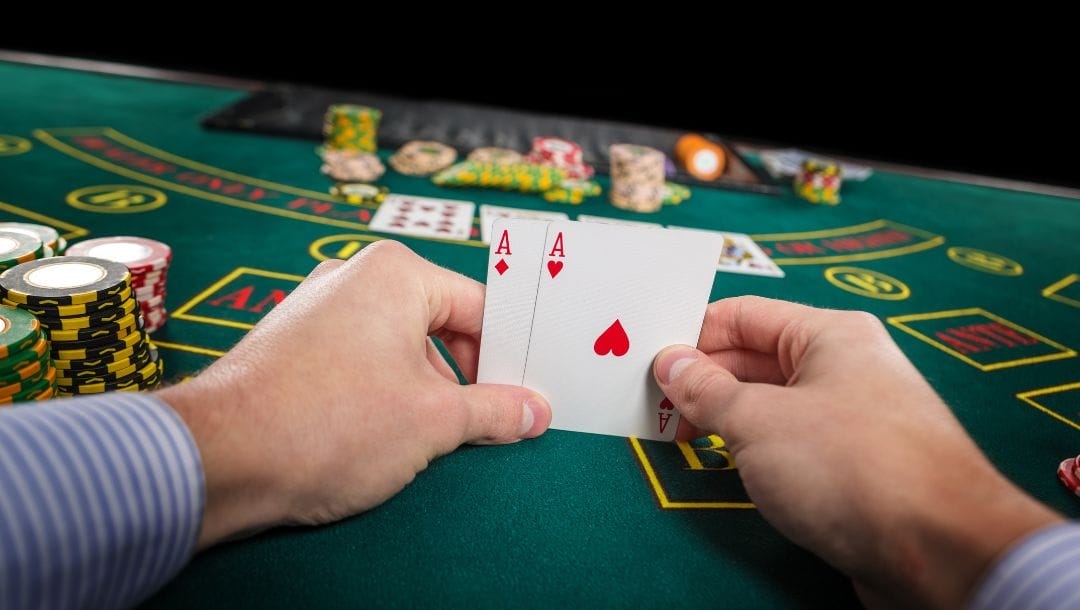Self-talk is the constant, internal dialogue you have with yourself. Read how to use this cognitive process to your advantage at the poker table.
How To Improve Your Performance in Poker Using Self-Talk

Most players, even rookies, recognize that poker is a fast-paced and mentally-demanding game. Players not only face mathematical and strategic challenges along the way but are very much influenced by the psychological and emotional elements of the game.
There exists a valuable psychological tool that can have a big say on a player’s overall performance — and that’s self-talk.
Self-Talk: What It Is and How To Use It in Everyday Life
Self-talk is a natural cognitive process and refers to the constant, internal dialogue you have with yourself. However, it’s said that the average person has heard the word “no” 148,000 times by the time they are 18 years old, while research shows that about 80% of a person’s daily thoughts are negative.
This self-talk definition implies that you have an internal dialogue that forms the bulk of your thoughts. It’s no surprise, then, that a self-critical nature can manifest in your choices and actions.
Turning the tide on negative thought processes into positive self-talk and positive reinforcement can help you to think optimistically and feel more motivated in your everyday life.
Self-Talk and Poker Strategies
Self-talk creates an internal narrative and commentary about what you’re doing, feeling and thinking and can take many forms. These can be motivational statements or self-instruction. It can also manifest in planning and strategy, for example: “Okay, I’m going to bet small here and see what develops.”
People all use self-talk to some degree unconsciously, but consciously applying self-talk techniques can provide many advantages in poker.
Putting your reads, strategic intentions and reasoning into words forces clearer strategic thinking. Verbalizing such plans as, “I’m going to make a small-value bet here based on his passive past play,” can crystallize optimal bet sizing and logic. The act of speaking through scenarios out loud has the effect of sharpening your analysis.
Other Benefits of Self-Talk at the Tables

On top of sharpening your strategy, self-talk has many other benefits, whether you’re at the tables or playing online poker.
Improves Focus
Internal play-by-play prevents your mind from wandering and keeps you immersed in the game. Self-talk means you verbalize observations, analyze and remain attentive to the nuances of each hand.
Builds Confidence
Affirming statements like, “I’ve played this spot well before,” can significantly boost your confidence and trust in your poker decisions, reminding you of your skills and past successes.
Enhances Emotional Control
Talking yourself down from frustration and other negative feelings gives you greater emotional control. When you feel irritation building, self-talk like, “Don’t let one hand throw you off,” can keep you on an even keel.
Reinforces Learning
Explaining poker concepts or odds calculations to yourself can improve retention and understanding, much like when students verbally summarize what they’re learning to digest the information better.
This technique could also be used when reading an online casino review, which will then allow you to apply the knowledge to other casino games or online poker tournaments.
How To Focus on Forming Core Beliefs
Telling someone to “think positive” when they’re deep into a devastating downswing during a game of Texas Hold’em poker online might seem overly simplistic or even be counterproductive. Instead, focus on forming strong and positive core beliefs about poker and have them at the ready when crisis strikes.
Some players say that poker is rigged and this cancels out any belief that there is a chance of winning at it. If you want to increase your chances of success, then you have to believe that poker is a game of skill.
Furthermore, reinforcing these beliefs through self-talk will help you to believe that you can actually become good at it. When it comes to downswings, reinforce the fact that the only thing that’s within your control is your win rate.
How Self-Talk Acts as a Way To Improve Gameplay

Looking at self-talk in the literal sense of the word, verbally going through your thought processes in the middle of the hand can actually boost your win rate. This is one of the reasons why sweat sessions are so popular among poker players.
Even if your game is observed by someone who’s below your skill level, the mere fact that you’re forced to justify your plays to them will likely work wonders for your game during that particular session.
Next time you’re playing poker, try to explain every decision you make. There’s a high chance that it’ll make your average play significantly better and help you maintain your focus throughout the whole session.
Practice Self-Talk and Improve Your Poker Skills
Not every poker player uses self-talk as part of their strategy, but it can give you a real edge if it’s applied correctly. It may not come naturally at first, but slowly incorporating self-talk into your gameplay and reinforcing core beliefs can improve your focus, confidence and emotional control. Become a better player and practice self-talk with online casino games when you register with BetMGM.


